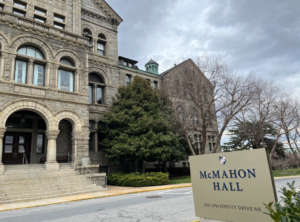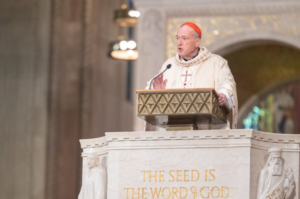Acclaimed Canon Lawyer Gives Annual James H. Provost Memorial Lecture

By Russell Blakeslee
On Tuesday, in a day of lectures about a response to the clerical sexual abuse crisis, Reverend John P. Beal, J.C.D. of the Diocese of Erie, Pennsylvania gave a lecture in Caldwell Auditorium on the relevance of social science for canon law. Fr. Beal, whose alma mater is Catholic University and who has taught here since 1992, is an expert in canon law. In 2008, he was awarded the Role of Law award, which is the highest honor given by the Canon Law Society of America.
Before his talk, two late canon law experts were discussed. Rev. James H. Provost, namesake of the annual lecture (in its 16th year) and 1991 recipient of the Role of Law award from the CLSA, as well as Rev. Stephan Kuttner, were both lamented and praised for their life’s work in canon law. Beal, as Provost’s former student, was then fittingly awarded the title of the Stephan Kuttner Distinguished Professor of Canon Law by President John Garvey.
In his remarks, President Garvey talked at length about various priests that he has met over the years, including Beal, who have lived their vocation dutifully.
In his discussion, Fr. Beal demonstrated the ways in which social science, the study of human society and relationships, has related to the state of the American Church throughout its history. Further, he cited problems the Church has faced in America when it comes to applying canon law to the American Catholic community.
Canon law, according to the website of the USCCB (United States Conference of Catholic Bishops), “is a code of ecclesiastical laws governing the Catholic Church.” It concerns itself with how the Church is run and how it relates practically to matters of things such as divorce, priestly succession, and punishment. Basically, it is where the spiritual meets the tangible in the life of the Church.
Citing three periods in American Church history; the foundational stage from 1789 to 1884, the expansion and integration stage from 1884 to 1960, and the bureaucratization and organization failure stage from 1960 to the present; Beal compared the history of the business hierarchy to the history of the Church hierarchy in America.
In the first stage, for example, businesses moved away from the model of sole proprietorship, towards the more effective and coordinated corporate model. This model passed over the sometimes messy negotiations sole proprietorships could get into, and favored hierarchy over entrepreneurship. John Carroll, Bishop of Baltimore and presider over what was effectively half of the United States and part of Canada at the time, was similarly interested in better organizing his wide flock. As a result, the distinctively American parish, started from the ground-up and run by a powerful lay trustee board, was replaced by the canonical parish. Churches started to be chartered to bishops effectively as holding companies, and as time went on priests lost considerable power, for example, in church finances to the authority of the bishop.
From 1884 to 1960 the business model became more pronounced and extreme, with companies such as U.S. Steel and Standard Oil dominating competition by controlling all aspects of production. In the Church, as Beal explained, American pastors became like middlemen of businesses — from lowly parish shepherd below an ominous bishop, to branch manager under an imposing, but not totalitarian, bishop. Pastors gained more respect in their communities as they began to control all aspects of parish life.
By the 1980s business corporations were trying to remake themselves and distinguish between problems which could be dealt with by individual units and problems which required the involvement of top management. During this third period, which extends to today, businesses are learning the importance of better communication between rungs of the corporate hierarchy.
In the Church, this has extended to the sexual abuse crisis. Beal finds a problem in priests who, like middle management, only communicate what people want to hear, and bishops who do not want to hear bad news. He also cites a growing lack of commitment and morality in American church structure, so that there is a greater and more complex hierarchy, with both an increase in ministries, or middle management, and therefore an increased capacity for corruption and selfishness.
Beal ended his lecture by noting a need to listen, on the part of priests, bishops, and laity, and a need to fix problems of corruption and not continue in the comfort of disloyalty or apathy.
Canon law, as Beal showed in the talk, is important for a sense of loyalty to the Church hierarchy and, in turn, to the successors of the Apostles who represent the person of Jesus to the Church’s flock and to the world.
“Are we prepared,” Beal said, “[to take on] a new level of self-awareness, candor, and responsibility in the Church?” Fr. Beal has written widely in publications such as America Magazine, and was co-editor of the 2000 New Commentary on the Code of Canon Law, published by Paulist Press. He has also served as chair of the Department of Canon Law at Catholic University from 1998 to 2002, and in 2004 became an an ordinary professor. He is currently the NCAA Faculty Athletic Representative for Catholic University, a post he has held since 2008.







